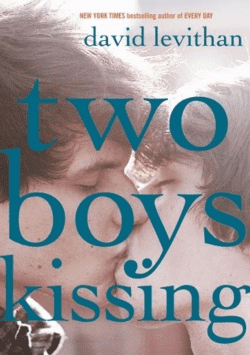A parent's request to remove David Levithan's novel Two Boys Kissing from a high school library has prompted a public hearing in a Virginia school district, Fauquier.com reports:
 Fauquier County Public Schools has received a request from a parent to withdraw from student use the book “Two Boys Kissing” by David Levithan which is a part of the high schools' library collections. A school committee at Fauquier High School decided to retain the book in its library collection, and the parent is appealing the decision to the superintendent.
Fauquier County Public Schools has received a request from a parent to withdraw from student use the book “Two Boys Kissing” by David Levithan which is a part of the high schools' library collections. A school committee at Fauquier High School decided to retain the book in its library collection, and the parent is appealing the decision to the superintendent.
In accordance with Policy 6-5.7, the associate superintendent is forming a review committee. On Wednesday, April 23 in the conference room of the school board office, the committee will consider the complainant's request. From 1:30-3 p.m. the committee will interview the complainant and possibly others related to the decision to withdraw or retain the book. From 3-4 p.m. the committee will hold a public hearing during which time interested citizens may speak to the review committee concerning the subject. The committee will discuss its findings and render a decision on the same date. All proceedings on April 23 are open to the public.
Here's part of what our book critic Garth Greenwell said about the novel, which he called "ambitious, humane, [and] extraordinarily moving":
The wonder of Two Boys Kissing is that it seems entirely adequate to the world in which young gay people live today. It's a world in which one boy can be embraced, even celebrated by his family, while his boyfriend is terrified of being found out by his parents. It's a world in which young people can attend a gay prom and fall headily in love, and then find themselves confronting violence on their second date. And, most painfully, both for the reader and for the chorus of lost elders who speak to us, it's a world in which gay young people still feel driven to commit violent acts against themselves.
But Levithan's novel doesn't just feel adequate to our present; it also—and, in my reading of LGBT literature for young people, uniquely—feels adequate to our past. Maybe Levithan's most poignant theme is the relationship between young gay people and the generation that preceded them, a generation given voice to by the grieving, exulting, longing ghost chorus that speaks to us on every page.



